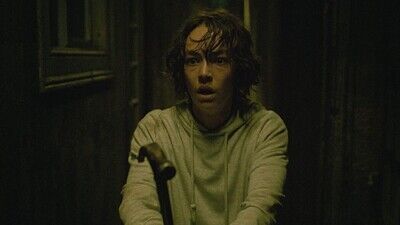Ed’s using an app called AnceStory because he was abandoned as a baby, and now wants to know about his family. Ryley supports her partner and joins him when he takes a trip to claim his mother, his twin brother, and his unclaimed baggage. Ryley and Ed have a genuine, easy way of talking to each other in these establishing scenes, mostly in the way that she back-and-forths with him. In an establishing scene, she tries to use a language translator app to order a creamy codfish dish, just to blend in. (it’s a local delicacy) “You’re gonna have the creamiest…wettest fish,” she teases. The ellipsis between Ryley’s words matters more than their intended meaning, like when Ryley first meets Amelia and her new mother-in-law suggests that Ryley should paint her portrait. This is only funny if you enjoy watching a young woman squirm when she’s cornered by her mother-in-law, who’s had a bit too much work done.
“I love to pose,” Amelia says. Her face is immobile and mis-shapen, making it difficult to read.
“Well, I love to draw, so…” Ryley says before an awkward laugh and a short pause. “Perfect pair.”
The movie’s elusive tone might be frustrating to viewers who expect Abrantes to be more aggressive or grisly in his humor. That’s a shame, given how good Abrantes is at only slightly over-inflating the psychosexual subtext of his characters’ obviously messed-up relationships. “Amelia’s Children” never feels like a one-note joke though. Rather, it’s the same joke, about the obvious wrong-headedness of Ed’s naïve search for his roots, only it’s funny because Ryley sees his story becoming what it clearly always was. To the deluded, it’s a fairy tale; to the skeptical, it’s a horror movie.
Horror fans will probably get “Amelia’s Children,” even though it might not be to everyone’s taste. There’s a couple of unnerving and/or gross standout moments, like when Ryley snoops on Amelia with her translator app, and her phone says, on her mother-in-law’s behalf, “She’s listening.” There’s also funny hiccup-sized gags scattered throughout, like when Amelia launches into a laughably heavy reverie—“Time eats us. Like potatoes.”—and Ryley does her best to feign nonchalance: “Well, it’s so nice to meet you.”
Abrantes could have taken bigger swings, but the ones he and his collaborators attempt are still disarming, being both unusually timed and comically well-punctuated.

